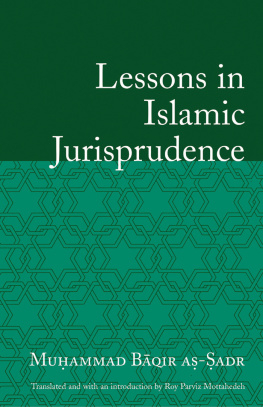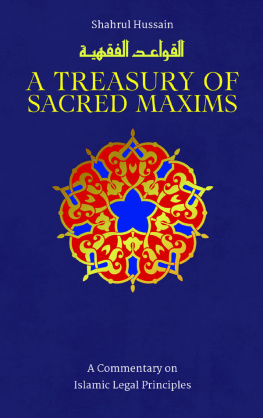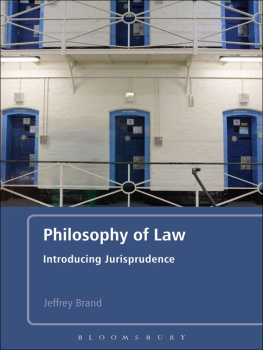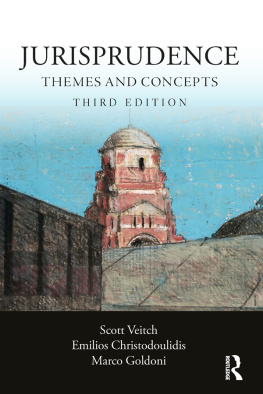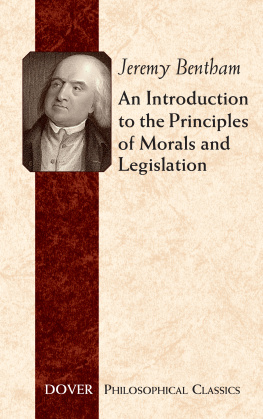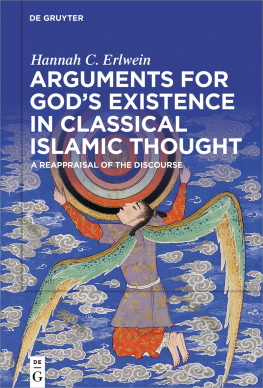Ṣadr Muḥammad Bāqir - Lessons in Islamic Jurisprudence
Here you can read online Ṣadr Muḥammad Bāqir - Lessons in Islamic Jurisprudence full text of the book (entire story) in english for free. Download pdf and epub, get meaning, cover and reviews about this ebook. City: Oxford, year: 2007, publisher: Oneworld Publications, genre: Religion. Description of the work, (preface) as well as reviews are available. Best literature library LitArk.com created for fans of good reading and offers a wide selection of genres:
Romance novel
Science fiction
Adventure
Detective
Science
History
Home and family
Prose
Art
Politics
Computer
Non-fiction
Religion
Business
Children
Humor
Choose a favorite category and find really read worthwhile books. Enjoy immersion in the world of imagination, feel the emotions of the characters or learn something new for yourself, make an fascinating discovery.
- Book:Lessons in Islamic Jurisprudence
- Author:
- Publisher:Oneworld Publications
- Genre:
- Year:2007
- City:Oxford
- Rating:4 / 5
- Favourites:Add to favourites
- Your mark:
- 80
- 1
- 2
- 3
- 4
- 5
Lessons in Islamic Jurisprudence: summary, description and annotation
We offer to read an annotation, description, summary or preface (depends on what the author of the book "Lessons in Islamic Jurisprudence" wrote himself). If you haven't found the necessary information about the book — write in the comments, we will try to find it.
Lessons in Islamic Jurisprudence — read online for free the complete book (whole text) full work
Below is the text of the book, divided by pages. System saving the place of the last page read, allows you to conveniently read the book "Lessons in Islamic Jurisprudence" online for free, without having to search again every time where you left off. Put a bookmark, and you can go to the page where you finished reading at any time.
Font size:
Interval:
Bookmark:

Lessons in Islamic Jurisprudence
Lessons in Islamic Jurisprudence
MUAMMAD BQIR A-ADR
Translated and with an introduction by
ROY PARVIZ MOTTAHEDEH

To my Arab friends past and present, Albert Hourani,
Charles Issawi, Jeanette Wakin, and so many others, who taught
me so much and have so much more to teach me.
LESSONS IN ISLAMIC JURISPRUDENCE
This ebook edition published by Oneworld Publications, 2014
First published by Oneworld Publications, 2003
Oneworld Publications
10 Bloomsbury Street
London WC1B 3SR
England
www.oneworld-publications.com
Roy Mottahedeh 2003
Original Arabic version
Muammad Baqir al-adr, Durs fcIlm al-U,
Beirut: Dr al-Kitb al-Lubnn, 1978
All rights reserved.
Copyright under Berne Convention
A CIP record for this title is available
from the British Library
ISBN 978-1-85168-393-2
eISBN 978-1-78074-686-9
Produced in association with the Harvard Center for Eastern Studies
Stay up to date with the latest books,
special offers, and exclusive content from
Oneworld with our monthly newsletter
Sign up on our website
www.oneworld-publications.com
Contents
Preface
Over six years ago a Sh businessman who knew of my continuing interest in Islamic and, in particular, Sh jurisprudence commissioned me to translate the first volume of Muammad Bqir a-adrs survey of Islamic jurisprudence. At that time I immediately prepared a translation which I considered accurate but which was almost entirely unintelligible to the intelligent lay reader. I felt both the poverty of my own understanding of the subject and the nearly complete absence of suitable received terms in English.
In the following five years, I read in Western jurisprudence and the secondary literature on Islamic jurisprudence. While I failed to gain anything like a thorough knowledge of either field, I did finally decide that my improved translation had become a work that I could offer to the public. Alongside this translation I have provided an introduction intended to give the general reader enough background to place adrs work in the legal and juisprudential context to which it belongs. Yet I still feel that the book is an orphan. It exists without proper relatives partly because virtually no other translation of such a work exists and partly because it should be accompanied by another separate book discussing Sh jurisprudence more extensively, both in terms of its relation with Islamic law and of its relation with Western jurisprudence. If I am favored with a long life and the ability to read more deeply in these fields, I hope to write the companion book that is needed.
The problem of terminology to which I referred above carries with it inescapable dangers. Literal translation is sometimes extremely misleading. For example, my dear friend, the late Dr. Jeanette Wakin of Columbia, suggested that I render the word khib as divine address. While this translation correctly captures the root idea of Gods speech directed in the second person to mankind, it also seems to suggest the existence of a divine e-mail address, something we all hope for but are unlikely to find. English technical legal terms are also a danger. Although there are established translation terms for many of these English words in modern Arabic they often do not correspond to pre-modern usuage. The term wa means positive in modern legal Arabic and a fine contemporary American interpreter of Islamic law has written an interpretion of the work of a pre-modern Muslim jurist in which he consistently translates this term as positive. But as a result he at times severely distorts the meaning of the original. Nevertheless, when terms are reasonably close to those of Western law, as with prima facie in this translation, I feel comfortable using them, as long as there is a glossary that makes their original meaning in Islamic law quite clear. I have also adopted two terms from philosophy, performative and assent, which, when glossed, seem to me to serve well. In some cases, I have introduced entirely new usages.
I have tried to be consistent in the use of all technical terms. These terms are given in bold type the first time they occur in the text. The reader can find the Arabic equivalents of all technical terms in the Glossary. There is also an index from Arabic to English. I believe the text of this book is more intelligible as a result of the consistency in the rendering of technical terms. If the book makes no other contribution to the field, it will at least have suggested some ways to make the study of Islamic jurisprudential thought more tractable for the non-specialist English reader.
Muammad Bqir a-adrs Lessons in Islamic Jurisprudence is a modern book. Nevertheless I feel certain that anyone who has mastered it will have a leg up in reading the extraordinarily rich tradition of pre-modern Islamic jurisprudential literature. The Arabic text of this book is readily available. My analytical summary on pages 145 to 172 is to some degree a commentary as well as a summary and may help the reader in following the text.
* * *
I am truly grateful to the many people who have made this book possible. Early on I received encouragement in my studies of jurisprudence from a distinguished lawyer friend, Dr. Saud Shawwaf. Over the years I have depended upon the intellectual assistance of Professor Hossein Modarressi of Princeton University, who has so generously given his time to educate me. I appreciate the learned comments on the translation by Dr. Aron Zysow. I also want to thank Professor Ridwan al-Sayyid of the University of Beirut, Dr. Abd-al-Karim Soroush, Kristen Stilt and Waheed Hussain for their valuable and important comments on the Introduction. Thanks are also due to Catherine Hall, who created the index.
It is, however, to my friend of forty years, John H. McCloskey, that I owe the most for his help in the final stages of preparing the manuscript, when my inability to type or to maintain any sort of organization almost defeated me.
Introduction
Muammad Bqir as-adr, one of whose works on Islamic jurisprudence is translated here, is among the leading modern thinkers in this field. This introduction seeks to locate his work for the intelligent lay reader by offering: a discussion of the nature of Islamic law; a discussion of the nature of Islamic jurisprudence; a discussion of the relation of this system of jurisprudence to Roman and canon law; and a very brief sketch of the life of the author.
The Nature of Islamic Law
It was by no means inevitable that law should have become so central to higher learning among most Muslims in the pre-modern period. For over a thousand years the great majority of Muslim jurists agreed that out of over six thousand verses in the Qurn there were only five hundred verses with legal content. Most of the legal verses concern ibdt, approximately acts of devotion, such as prayer and the pilgrimage. Out of these five hundred verses, there are about one hundred and ninety that deal with non-ritual aspects of the law; only matters of inheritance are laid out in any detail.
As to why legal culture became central to so many Muslims in subsequent centuries, I can give only a partial answer. The Qurn, according to one very widely accepted reading, by its spirit encourages legal culture since it speaks repeatedly of the udd, literally the limits or boundaries. In the Qurn this word does not mean the prescribed punishments, as it came to mean in later Islamic law, but the limits which circumscribe good behavior; and in almost all instances
Font size:
Interval:
Bookmark:
Similar books «Lessons in Islamic Jurisprudence»
Look at similar books to Lessons in Islamic Jurisprudence. We have selected literature similar in name and meaning in the hope of providing readers with more options to find new, interesting, not yet read works.
Discussion, reviews of the book Lessons in Islamic Jurisprudence and just readers' own opinions. Leave your comments, write what you think about the work, its meaning or the main characters. Specify what exactly you liked and what you didn't like, and why you think so.

